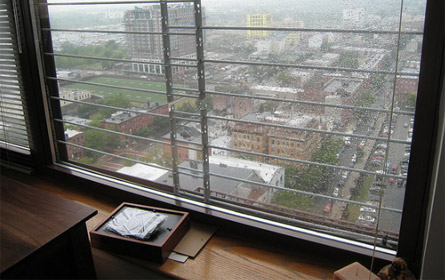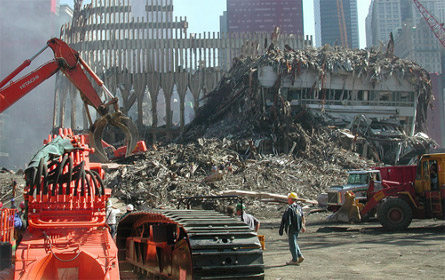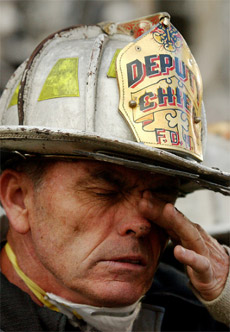Citing 'Emergency,' Council Passes Animal Bill

The New York City Council yesterday passed a bill that would extend hours at animal rescue centers, seek to reduce the number of feral cats prowling city streets and increase the budget for animal services in the five boroughs.
Yet while many animal rights groups applauded the measure, other organizations and some elected officials condemned it as a ploy to relieve the city of having to provide additional services and of possibly losing a lawsuit challenging its treatment of animals. As evidence, these advocates charged the City Council had rushed the bill through, holding hearings last week and passing it today.
City Council Speaker Christine Quinn said the bill had been in the works for about nine months. The council decided to act today, she and the measure's author, Manhattan Councilmember Jessica Lappin said, because animals in the city face an emergency.
On that point, it seems, few disagree.
The Council Bill
The measure, Intro 655, which passed 46 to 4, has a number of provisions.
It would expand the hours at centers in the Bronx and Queens where people can drop off stray and lost animals. In those two boroughs, the center currently are open only several hours a week. They will now accept animals for 12 hours a day seven days a week.
The bill also substantially expands the hours when field services will go out and pick up injured or otherwise distressed animals.
In an effort to reduce the number of feral cats throughout the city, the measure requires owners to spay or neuter cats they allow to roam free and seeks to strengthen trap-neuter-return, in which groups or individuals collect feral cats and neuter, vaccinate and identify them before returning the animals to the streets. The health department will issue rules requiring registration of anyone who treats the animals. "We want to make sure people really know how to do it, are trained how to do it," Quinn said.
While the aim of these initiatives over the long term, said Jane Hoffman, president of the Mayors Alliance for NYC's Animals, is to "reduce and eventually eliminate cats outdoors," in the interim "what you need to do is give them a good life and treat them humanely."
The bill requires the Department of Health and Mental Hygiene step up its monitoring of Animal Care and Control, the much maligned nonprofit that runs the animal shelter system. And it increases funding as well, with a extra $1 million this fiscal year and a hike of 77 percent -- to $12 million -- by 2014. In an effort to attract additional private funding, the bill also adds two more members of the public to the Animal Care and Control board.
Together, Lappin said, "This will really improve the services on the ground in the Bronx, Queens and all five boroughs."
A number of animal rights groups, agreed issuing statements in support of the measure.
"In these tough fiscal times, access to increased monies for programs and services that have been stretched so thin is a welcome change," Hoffman said in a statement issued by several of the groups. "Providing this infusion of critical resources will help save lives and prevent animal suffering."
Too Little, Too Soon
Even the four council members who voted against the measure did not disagree with that. The problem, critics said, is that the bill does not do enough to repair what they see as a severely flawed system a system that shortchanges the Bronx and Queens.
Much of the controversy goes back to 2000 when the City Council passed a bill requiring a full-service shelters in each of the boroughs. Neither the Giuliani nor the Bloomberg administrations complied with that, a failing Quinn attributed to the difficulty of finding appropriate space for the facilities.
In 2009, the group Stray from the Heart filed suit accusing the city of violating the law. The advocates won in the trial court, but an appeals court ruled the group did not have standing to challenge the city on this. Then earlier this month, the Court of Appeals agreed to hear the suit.
The bill passed yesterday would no longer require the full-service shelters in all boroughs. The service centers it discusses do not have veterinarians on staff. Calling the bill "a wolf masquerading in sheep's closing," Laurie Bleier of Brooklyn Animal Foster Network, said it will do nothing to get a vet to a dog hit by a car in the Bronx or to provide medication to an abused dog in Queens.
By acting now, some critics said, the council let the city off the hook in the event of any legal ruling against it.
"I don’t think you have to be smarter than Bonzo the chimp to figure out what's going on," City Councilmember Peter Vallone, who voted against the bill, said before the meeting.
Later, speaking in chambers, he said, "This bill insures the people in Queens and the Bronx won't have a full-service shelter. It may rain cats and dog before they have that shelter."
In a statement, Ed Sayres, president and CEO of the ASPCA denied the measure would prevent the establishment of more full-service shelters.
"We cannot stand by and let animals suffer in our city," he said. "Intro 655 is an immediate solution in the midst of this crisis. We absolutely believe that there must be animal shelters in all five borough but we need urgent support now."
Show Them the Money
Critics also worry the promised $12 million never will materialize.
As he explained his no vote, City Councilmember Dan Halloran raised that concern. "There is a problem in City Hall in keeping the promises it makes to this body in budget negotiations," he said. "I hope the city's animals will not pay the price."
Quinn acknowledged there were no guarantees. "All you can do with any budget is make sure the money is in there one year at a time," she said.
Michelle Villagomez, a spokesperson for the ASPCA, said the funding was needed. "New York City Animal Care and Control has experienced budget cuts, she said, that have had an effect on staff and services and forced it to "make reductions in day to day care." The additional money, she said, will improve care of animals, increase the likelihood of animals being adopted and expand services in the outer boroughs.
Underlying much of the debate on both sides is a general discontent with Animal Care and Control and with city funding for animal services. "You’re giving $10 million to one of the most mismanaged board of directors," Zelda Penzel of S.O.S. Save Our Shelter Animals said. "It’s a total sham."
Councilmember Vincent Ignizio, who said he originally planned to vote against the measure but changed his mind, chastised the Bloomberg administration "for allowing the state of repair of ACC to fall so low."
Councilmember Leroy Comrie complained the agency had repeatedly failed to respond to complaints about packs of wild dogs in his district.
Recently Manhattan Borough President Scott Stringer has called for a total revamping of Animal Care and Control. "There are inhumane conditions. There are healthy animals being put down, animals sleeping in their own waste," Stringer http://ourtownny.com/2011/09/21/who-will-save-them/tolf Out Town. "We have members of the board who have absolutely no experience in fundraising and no experience in animal control. It's a disgrace."
Stringer, according to the paper, has proposed that Animal Care and Control be made a quasi-independent agency like the Central Park Conservancy.
Quinn acknowledged concerns about Animal Care and Control resources and performance. Even with the increase in funding, she said, "When you compare it to other cities, it is not really the amount of money that we need."
As for the job the agency has done, she told her fellow council member, "We're not going to take Animal Care and Control at its word. … For some time it hasn’t been up to its mission."
Putting Housing Inspectors on the Guards

With the budget passed and the summer over, the City Council yesterday got returned to its regular schedule. But while the fall usually brings a spate of legislation -- a fraction of which even sparks controversy -- Tuesday's meeting brought unanimous votes on the only two bills under consideration.
The highest emotion came in comments on an item not on the council agenda: the detention by police Monday of one of the council's members -- Jumaane Williams -- and a political aide.
Several council member stood to declare their support for Williams and to call for the changes in police procuedres that several said had lead to the handcuffing of the two black men -- and to the stops of hundreds of black and Latino men every day.
Putting Their Guard Up
In what City Council Speaker Chirstne Quinncalled an efort to make better use of city resoures, the council approved Intro 531-A, which would step up enforcement of city rules requiring that all apartments occuped by young children have guards on the window.
Currently, only health inspectors have the authority to check for window guards. The bill would also allow housing inspectors to check for the window guards and to order owners to install them where needed. Owners who do not coply within 21 days face fines.
Empghasizing the measure does not take any authority away from the health department, Quin said it "also gives that power to housing inspectors who are out there every day."
In the city, Quin said, "The number of children who fall out of windows is not as high as it was at one time," but national figures indicate the need to make sure that window guards are in place.
Cleaner Waters
The council also approved a measure aimed at cleaning up the city's 520 miles of shoreline and its waters by requiring the Department of Environmental Protection, Department of Sanitation and Department of Small Busines Servies to coordinate efforts to combat illegal dumping. The agencies also would also have to report on the implementation of the plan.
Speaking next to a photograph of tires dumped on the shore, Quinn said the city has not had a unified effort to prevent dumping and the efforts of various agencies have been "sporadic at best and clearly inadeuqate."
A Taskforce on Violence
Before the meeting -- and after a weekend marked by a rash of gun violence cross the city -- Quinn announced the council had formed a taskforce on gun violence to be chaired by Williams and Councilmember Fernando Cabrera. Acording to the announcement, the committee, which will focus on black and Latino communities, will look at the causes of the violence and look at ways the city could help combat it.
As an example Quinn cited a campaign in 2008 to fight back at the taboo on snitching in some neighborhoods.. The city covered graffiti condeming snitching, she said, and "we began to send a message that it's not snitching, it's saving a life."
Quinn conceded that at least some of the problem lay not in the city, but with lax gun laws in other parts of the country. While supporting the push for tougher gun laws nationally, she said, "We are also going to find ways to do what we can locally."
Fight Over Compensation for 9/11 Responders Shifts to Cancer Victims

"The Tea Party hasn't dealt with John Feal yet," said John Feal, the former construction worker who has been one of the loudest advocates for sick and injured 9/11 rescue and response workers. Missing half a foot as result of his efforts at Ground Zero, Feal often stands out among the politicians and union officials who speak in diplomatic, politically safe terms.
Feal was referring to his movement's latest hurdle: amending the James Zadroga Act -- a bill passed last year ensuring federal funding for 9/11 health monitoring and treatment programs -- to cover certain types of cancers. In July, the federal government announced the bill would not provide medical benefits to first responders who developed cancer. Now the unions and other hope a new report will make their task easier.
Difficult Politics
Even with a Democratic Congress and the help of the New York and New Jersey congressional delegations, passing the Zadroga bill at all turned into a Sisyphean task in the face of fierce Republican opposition. After a series of compromises, Congress finally approved it last year after what New York Sen. Kirsten Gillibrand called a "Christmas miracle."
The problem is not only that the House of Representatives has fallen into Republican control since then, but that the hard-line Tea Party caucus has proved it will adamantly oppose almost any increase in federal spending. Standing for thrift instead of helping first responders becomes more mainstream with each passing year since 9/11.
Even in the five boroughs, criticizing the Zadroga bill -- named for a New York police detective who died from what many believed were 9/11 related-illnesses -- is no longer political suicide. Bob Turner, the Republican running for the House seat vacated by Anthony Weiner, said the bill was "too broad" because it covered of volunteers. He has the endorsements of former mayors Ed Koch and Rudy Giuliani, as well as Long Island Rep. Peter King, a Republican credited with fighting opposition to the bill in his party.
A Fight Over Evidence
In announcing their decision not to cover cancer victims, federal officials said no solid evidence existed linking the cancers to exposure to the toxins found at the former World Trade Center site.
The reportby the National Institute of Occupational Safety and Health, though, also said that there was no evidence that a link did not exist. Trying to prove things one way or the other, the institute said, presents a challenge because there are few published studies on the issue- - and even fewer that were peer-reviewed -- and because cancer is "not a rare disease."
The federal government expects to review the issue again in the middle of next year.
Last week, though, responders got a boost when The Lancet released a study that, the New York Times reported, "says firefighters who toiled in the wreckage of the World Trade Center in 2001 were 19 percent more likely to develop cancer than those who were not there."
The Lancet reported it found "a modest excess of cancer cases" in those who were at the trade center site. It said it remains cautious about the findings because of the short time since the 9/11 attacks and because the increase is not confined to any particular type of cancer.
Feal, though, dismissed such hesitancy. "I don't need a doctor or a scientist to tell me that 9/11 caused cancer," he said. "We see the pain and suffering every day and we expect with this study that cancer be added to the bill in an expedited manner."
Union leaders like Uniformed Firefighters Association President Steve Cassidy have noted in the past that responders under the age of 40 have already developed cancers, even though the initial reports said they would take at least 10 years after 9/11 to occur.

"Cancer is the quintessential disease," Feal said, noting that these types of cancers are either hereditary or caused by carcinogens. "We have the statistics and the numbers, and they can't deny it."
Last week, the federal government announced one expansion of the program – extending it to people who lived and worked south of Canal Street. Originally the compensation only applied to people who had been south of Reade Street, about 10 blocks farther south.
Evidence suggests "that prolonged exposure to dust between Reade and Canal streets created a demonstrable risk of physical harm," said Sheila Birnbaum, head of the Sept. 11 Victim Compensation Fund.
At the same time she ruled out extending benefits to cancer victims, at least for now.
Hurdles Along the Way
On the one hand, implementation of the Zadroga act is working well, according to advocates, both in terms of ensuring that the 9/11 health centers can operate without the distraction of operating on annual appropriations and in allowing sick responders to seek compensation.
"They're not looking over their shoulder any more," Feal said of health providers. "Everything is up and running smoothly. That's a bonus. The compensation part is going to start in October. We're on track. Everything we've predicted in the past is coming to fruition."
But getting to this point has been a political drama. First, the city’s chief medical examiner claimed that Zadroga had, in fact, not died of 9/11 illnesses but from prescription drug abuse. While this didn’t directly affect the proposed legislation, it damped his name’s significance.
In late 2008, Congress delayed voting on the bill to attend to the emerging financial crisis. And when a Democratic House seemed to ready to pass the bill, it used a rare parliamentary procedure to block voting on Republican amendments to the bill, in particular one that would bar undocumented immigrants from benefiting from the law. That maneuver meant the bill needed a super-majority to pass, rather than 50 percent plus one, effectively killing it at the time.
The bill finally did come through last year with some compromises on funding, but Republicans demanded language that required that all recipients of Zadroga bill aid be checked against the terrorist watch list. The screening found no terrorist suspects seeking aid.
"They made this big deal about nothing," said Bill Henning, the chairman of the New York Committee for Occupational Safety and Health. "It was just so insulting."
Beyond helping those disabled by their time on "the pile," union officials and health advocates hope the information that comes out of the compensation fund can help future workers. On Sept.16, the New York Committee on Occupational Safety and Health will hold a conference titled "Protecting Worker and Community Health: Are We Prepared for the Next 9/11?" with speakers including World Trade Center Health Program director John Howard and Occupational Safety and Health Administration chief David Michaels. The reason so many workers are sick now, advocates say, is that the city did not provide adequate masks to protect responders from the toxic soup at Ground Zero. They also claim that the U.S. Environmental Protection Agency at the time made overly optimistic statements about the air being safe to breath.
As Feal noted, the current state of health care for the workers might be adequate, but it has been a struggle to get Congress to commit the federal government to funding these programs.
"We lose a lot of good people in every battle we have to face: a firefighter, a cop, a construction worker," Feal said of the responders who have died in the meantime. "It's a shame that they don't get to see the good."




